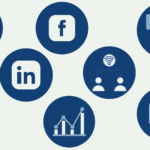Com munications by the institution and among the alumni are critical to the alumni relations effort. Social media is a quick and frequent way to communicate to alumni and among alumni. Yet there is also the need for community building through interactions as a result of communications. For community building through engagement, an alumni portal is a more effective and more protected system than social media. An alumni portal can foster interactions with and among your alumni. Social media has its own advantages and is a crucial part of a full alumni relations effort. Here is a comparison of alumni portal features compared to social media options:
munications by the institution and among the alumni are critical to the alumni relations effort. Social media is a quick and frequent way to communicate to alumni and among alumni. Yet there is also the need for community building through interactions as a result of communications. For community building through engagement, an alumni portal is a more effective and more protected system than social media. An alumni portal can foster interactions with and among your alumni. Social media has its own advantages and is a crucial part of a full alumni relations effort. Here is a comparison of alumni portal features compared to social media options:
1. Privacy and Exclusivity:
- Alumni Portals: Alumni portals offer a more controlled and private environment. Access is often restricted to registered alumni, ensuring that interactions and content remain within the alumni community.
- Social Media Groups: Generally, social media groups are open to anyone, which means that alumni interactions might not be as private or exclusive. While group settings can be adjusted to closed or private, some level of public visibility is inherent.
2. Data Ownership and Control:
- Alumni Portals: Organizations have full ownership and control over the portal, including data management, customization, and privacy settings.
- Social Media Groups: Social media platforms own the data and have control over the group’s functionality. Alumni relations personnel have limited control over data management and privacy settings.
3. Alumni Database Integration:
- Alumni Portals: Alumni portals can be integrated with your alumni database, enabling seamless data updates and ensuring that the information remains current.
- Social Media Groups: Integration with your alumni database might be limited, making it harder to ensure that data is up-to-date and accurate.
4. Customization:
- Alumni Portals: Alumni portals can be customized to match your school’s branding, navigation, and features.
- Social Media Groups: Customization options might be limited to basic profile and cover image changes.
5. Communication and Engagement:
- Alumni Portals: Alumni portals offer tailored communication options such as event registrations, targeted announcements, and dedicated forums for discussions.
- Social Media Groups: Although alumni are already familiar with the social media platforms, making engagement more natural, the content can easily get lost in a sea of posts and updates.
6. Content Management:
- Alumni Portals: Content can be categorized, tagged, and archived for easy navigation and retrieval.
- Social Media Groups: Content is organized chronologically and can be hard to find over time.
7. Branding and Identity:
- Alumni Portals: Your school’s brand identity can be maintained consistently within the portal.
- Social Media Groups: Your school’s brand might get diluted within the social media platform’s branding.
8. Analytics and Reporting:
- Alumni Portals: Alumni portals can offer more in-depth analytics on engagement, content consumption, and user behavior.
- Social Media Groups: Analytics might be limited to basic engagement metrics.
9. Alumni Engagement Strategy:
- Alumni Portals: Engagement can be driven by your alumni relations strategy, fostering a more targeted and consistent approach.
- Social Media Groups: Effective engagement depends on the algorithms of the social media platform, and not all alumni might be active on that platform. Some alumni won’t join any social media platforms which is a significant barrier to engagement.
10. Learning Curve:
- Alumni Portals: Once your alumni join and learn how to navigate the specific features of the portal, it will evolve and grow with the community.
- Social Media Groups: Although some alumni are familiar with the latest social media, many are reluctant to be on any specific platform or will switch their allegiance frequently to be on the “hottest” platform.
An alumni portal provides a platform for interactions, data management, personalization, and brand consistency that fosters enduring connections and nurtures the sense of community among your alumni network.
Read more articles in the Alumni Relations Transformations Series at AlmaShines or the Impactrics Resources area.



